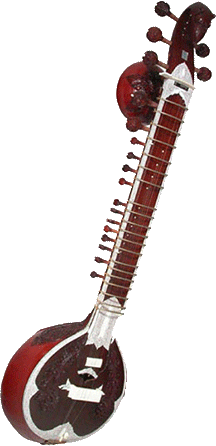
BRUMBEAT "Summer of Love" 50th Anniversary Special
The Beatles unveiled their influential 'Sgt. Pepper's Lonely Hearts Club Band' LP in June 1967 and pop music would never be the same again! "Flower Power" ruled, the BBC launched Radio 1 and the "Summer of Love" unfolded to the sounds of hip new groups like The Move and Traffic, The Jimi Hendrix Experience, and The Pink Floyd.
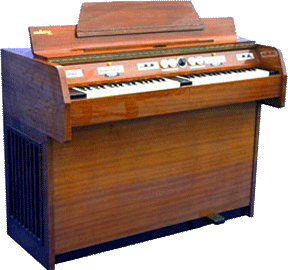
"The Summer of Love" is a name widely applied to the social phenomenon that took place in 1967 during which time pop music was elevated from just an entertainment to a legitimate art form. Believe it or not, it all happened 50 years ago but much of the music made then is still just as popular today.
If you're a fan of West Midlands bands, you'll be happy to know that a lot of those groovy sounds were created by local groups who were at the cutting edge of the new music revolution during the 1960s.
1967 was the decade's high-water mark in terms of new and creative ideas both culturally and musically. The Beatles sang the year's anthem 'All You Need Is Love' amid ever increasing protests against war alongside the social struggles for human equality and understanding. This was a lot of heavy stuff going on against a cold war backdrop - but it was fun too.
To celebrate this colourful time of spiritual and artistic enlightenment, we'll have a look at more than a dozen great records by West Midlands bands - some of which made the charts in 1967 as well as some that didn't but should have. Peace and love to you all!
I'm A Man
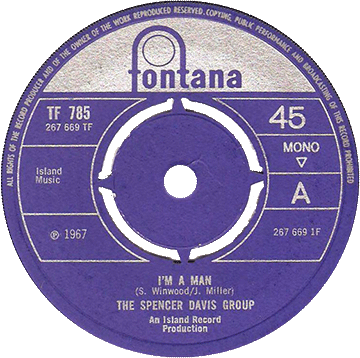
The Spencer Davis Group January 1967
A great record to kick-off 1967, this final single from the Spencer Davis Group to feature Steve Winwood was probably the heaviest song they had recorded to date. Following a busy and successful previous year for the group, 'I'm A Man' seemed to indicate the start of another year of unstoppable hit records for the line-up.
Apparently, this record co-composed by Steve Winwood and producer Jimmy Miller, was originally meant to be part of the soundtrack for a film about "Swinging London". It has little resemblance to another song called 'I'm A Man' by blues legend Bo Diddley who had a hit with it as early as 1955. Steve never sounded more assertive and confident as on this one with his incredible vocal and prominent hammond organ.
Steve's lyrics are also somewhat prophetic when you consider the verse;
"Well, my pad is very messy and there's whiskers on my chin
And I'm all hung up on music, and I always play to win
I ain't got no time for lovin' 'cause my time is all used up
Just sittin' round creatin' all that groovy kind of stuff"
It's really the fantastic "groove" that makes this record so good. Opening with a great bass riff and drums from Muff Winwood and Pete York respectively, you can't help getting drawn into it. Sadly, this highly-danceable pop single that got to Number 9 in the UK charts, turned out to be the last from the group featuring Steve and Muff Winwood who both left in April of 1967.
The Eagle Flies On Friday
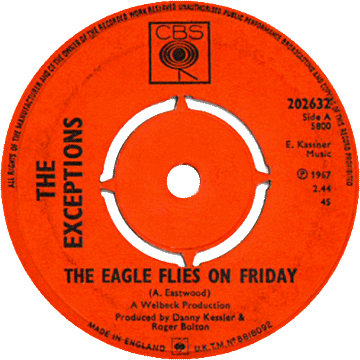
The Exceptions March 1967
Quite an unusual record this one. Not straightforwardly catchy with a memorable chorus as you would expect for a pop single, but it does grow on you with repeated listenings. A then-unknown Robert Plant played the tambourine on it!
'The Eagle Flies On Friday' was the first record release by the band. Something of a local "supergroup", The Exception were led by multi-instrumentalist Alan "Bugsy" Eastwood who composed most of their original music. Alan and guitarist Roger Hill were both members of The Brumbeats in the early 1960s.
This drums and vibes-driven track was inspired by an American expression relating to the eagle on their dollar bill with lyrics about an employee's weekend escape from his oppressive boss after getting his pay on Friday.
"The eagle flies on Friday, I won't be back no more
Spreading my wings and leaving, I just can't take no more"
Alan Eastwood's lead vocal is certainly very American influenced in this respect, although for this one, the song may have more in common with Eddie Cochrane's 'Summertime Blues'. In addition, Roger Hill contributes a cutting guitar solo while future Led Zeppelin star Robert Plant (who hitched a ride down to London with the band), plays tambourine.
The group were good on-stage where they often alternated on different instruments including the vibraphone played by Alan Eastwood along with drums, harmonica, and vocals - sometimes all at the same time! This initial line-up included lead guitarist Roger Hill along with bass guitarist Dave Pegg - previously from The Uglys and who would later go on to lead Fairport Convention.
I Can Hear The Grass Grow
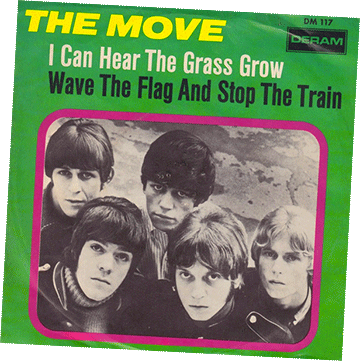
The Move April 1967
This high-energy record was the A-side of The Move's second single. It was composed by Roy Wood who had taken on the role of group songwriter following the success of their 'Night Of Fear' pop hit that reached Number Two in the UK record charts early in 1967.
'I Can Hear The Grass Grow' like many of Roy Wood's early hits with The Move, is sometimes attributed by rock music writers and historians as the result of psychedelic drug use. The group's drummer Bev Bevan said; "Nobody believed that Roy wasn't out of his head on drugs - but he wasn't. It was all fairy stories rooted in childhood."
There certainly was some use of "certain substances" within the group as the summer of 1967 progressed though only Trevor Burton and Ace Kefford have admitted to the regular taking of medicines - but hey, it was all for a good cause. Make of it what you will as Carl Wayne's lead vocal proclaims;
"My head's attracted to a magnetic wave of sound
With a stream of coloured circles makin' their way around
I can hear the grass grow, I can hear the grass grow
I see rainbows in the evening"
Ace's thundering bass guitar adds a lot to this recording in similar fashion that John Entwistle contributed to The Who's high-energy records. A powerful number when performed on-stage, this was one of the few early songs The Move kept in the set during their last days of performing live by which time it had been extended into a 10 minute instrumental jam (see review Live at The Fillmore 1969). Backed with the more sedate 'Wave Your Flag And Stop The Train', the single made it to Number 5 in the UK charts.
Golden Apples
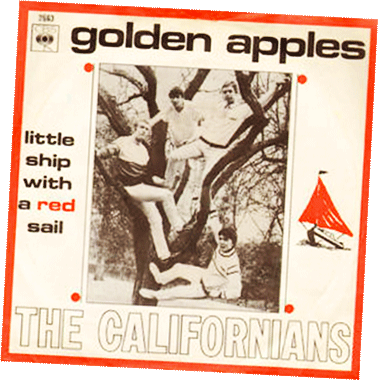
The Californians April 1967
Imagine the theme of the famous TV wild west show "Bonanza" and add to it music from "Arabian Nights" or something similar. The Californians exotic recording of 'Golden Apples' is "mind blowing" so if you've not heard this one it's well worth a listen.
This often-overlooked West Midlands line-up made some great records during the 1960s and 'Golden Apples' was their first single. The group were produced by Irving Martin who added a lot of orchestration and echo, not unlike Phil Spector, to create a "wall of sound" that characterized many of his productions.
The Californians lead vocalist John O'Hara recalled; "Decca No.1 studio was as big as the Wolverhampton Civic Hall. It could house orchestras of 40 or 50 players. It was like entering another world. You lost all sense of time and space. You could be in there for hours, even days, and you would have no idea when you came out if it was going to be day or night or what day it was. I loved it!"
The single's B-side titled 'Little Ship With A Red Sail' is also very good with both songs featuring wonderful vocal harmonies from all the band members. Golden Apples didn't make the charts but it's a much-appreciated soundtrack to the BrumBeat summer of 1967.
Say You Don't Mind
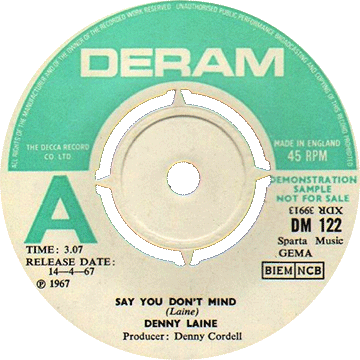
Denny Laine April 1967
This great pop single by the former front-man of The Moody Blues should have been a hit. Disillusioned by the music business, Denny formed "The Electric String Band" in the summer of 1967 but maybe it was an idea just a little too far ahead of its time?
Having left his chart-topping group the previous year, Denny Laine tried forging his own identity as part of London's "underground" scene in the company of new psychedelic groups like The Crazy World of Arthur Brown, The Soft Machine, and The Pink Floyd. Lyrically, 'Say You Don't Mind' could be autobiographical when you consider the circumstances.
"I came into this scene when my dreams were getting bad
And who rides with the tide and who's glad with what it had
I've been doing some whining, I've been doing some finding"
Influential radio disc jockey John Peel rated the record highly when he played it on his popular show 'Top Gear'. Despite critical acclaim, the record didn't sell enough copies to make the charts. The song's commercial appeal was confirmed in 1972 when former 'Zombies' vocalist Colin Blunstone's version was a Top 20 hit.
Fly Me High

The Moody Blues May 1967
By 1967, the pressure was mounting on the recently re-organized Moody Blues. With their 1964 international hit record 'Go Now' a distant memory, it was make or break time as they went into the recording studio in March with new members John Lodge and Justin Hayward.
Justin Hayward had come fully equipped into the group with a bagful of commercial sounding songs of which 'Fly Me High' was selected for the Moody's new single. Perhaps even more significant was the recording session itself in which the group was introduced to Decca producer Tony Clarke who would go on to produce their biggest selling albums.
Justin recalled; "One of the first things we did together was record 'Fly Me High' at our own expense at Regent Sound Studios in Denmark Street. The suits at Decca liked it but thought it could be recorded better. So we turned up at the Decca studios where we met Tony Clarke for the first time. He was assigned to us as in-house producer and we recorded the song again. Decca released the new version and it was picked up by the BBC who used it as a jingle for a while. The recording engineer on 'Fly Me High' was Gus Dudgeon who went on to produce mega-hits for Elton John. He did a great job!"
Although it wasn't a hit, 'Fly Me High' sounded great on the radio and was also popular with the audience when the band played it on-stage. Interestingly, the song was later covered by West Midlands group Ambrose Slade as a track on their first album.
Paper Sun
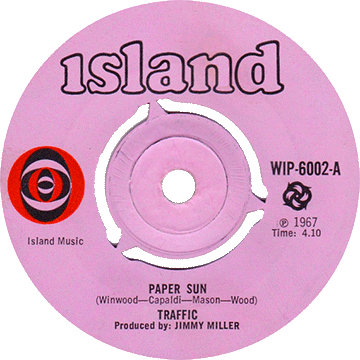
Traffic May 1967
"This is a photo of a Number 1 record" according to Island Records promotional adverts printed at the time. Traffic's debut single actually got to Number 5 in the UK charts but it was indeed a perfect pop record for the summer of 1967.
'Paper Sun' was definitely a product of is time. Flute, saxophone, tablas, and a real Indian sitar played by Dave Mason provide wonderful support for Jim Capaldi's trippy lyrics;
"So you think you're having good times with a boy that you just met
Kicking sand from beach to beach, your clothes all soaking wet
But if you look around and see a shadow on the run
Don't be too upset because it's just a paper sun"
Steve Winwood's new band following his departure from The Spencer Davis Group, set trends that would be followed by other pop groups. "Getting it together in the country" was inspirational to many - especially when Traffic chose an isolated and reportedly haunted cottage in Berkshire as their communal living space. There they were free to experiment musically (and otherwise) without distraction. "We lived on cheese sandwiches and tins of rice pudding" said Steve.
According to rock music history, 'Paper Sun' was the first song Steve Winwood and Jim Capaldi wrote together. Although democratically credited to all four members of the group, it signalled the start of a creative partnership that would continue on and off for decades.
Take My Hand
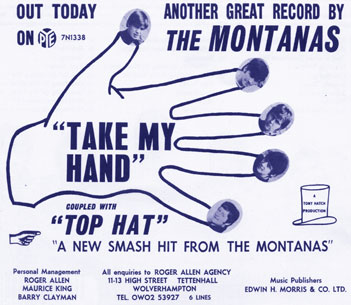
The Montanas June 1967
'Take My Hand' sounds exactly like a good pop record should sound like for the summer of 1967. It's got all the great ingredients - commercial production, tuneful melody, great harmonies - and like the promo says, should have been "A NEW SMASH HIT FROM THE MONTANAS"
"Take my hand and follow me, let me lead you into love
There's a place for you and me, and a thrill you've never dreamed of"
This talented line-up from Wolverhampton had some of the area's best musicians - all veterans of early 1960s beat groups. They also had the backing of PYE Records producer Tony Hatch who made hits with 'The Searchers' and 'Petula Clark' as well as composing no less than the theme tune for popular West Midlands TV soap opera 'Crossroads'.
The Montanas were a perfect pop group in many ways. Great performers on-stage, young and photogenic with pin-up good looks, and they all had great singing voices. If there's one big disadvantage The Montanas had, it was lack of a strong songwriting talent within the group which left them at the mercy of those who may not have operated in the band's best interests.
Their previous single A-side titled 'Ciao Baby' sold well and was voted "a hit" on the popular BBC TV show Jukebox Jury. 'Take My Hand' was just as well received which made The Montanas surely on the verge of a big chart breakthrough. Their next record just had to be the one to do it?
Time Seller
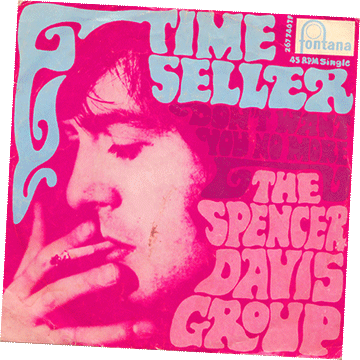
Spencer Davis Group July 1967
A big departure from their previous records, the progressive-sounding 'Time Seller' that reached Number 30 in the UK charts seemed to indicate a new and promising musical direction for the group. This first record release from the band without Steve and Muff Winwood was actually quite good!
The pressure was on and armed with new members guitarist/vocalist Phil Sawyer and keyboard wizzard/vocalist Eddie Hardin, the Spencer Davis Group set about composing and recording songs knowing the record-buying public would make inevitable comparisons with Steve's new band Traffic.
Eddie Hardin recalled; "Spencer came up with all the song titles. He'd think of a title and I'd write the tune. He wrote most of the lyrics and he was going through a divorce at the time and Steve Winwood had just left him so he was a bit cheesed off. For 'Time Seller', Spencer wrote most of the lyrics. Phil Sawyer sang the lead vocals which were double-tracked. It was a big hit in Holland, Germany, and America."
'Time Seller' featured an innovative heavy cello backing similar to what The Beatles would use on their Magical Mystery Tour recording of 'I Am The Walrus'. Though the record was hardly danceable, the trippy lyrics tell of a mystical character who has the magical ability to sell time;
"People are shadows, trapped in a golden well
And only children's lives can break the spell
We live in a land where the clocks grow on trees
And birds sound just like a cool summer breeze"
Of the recording session, Spencer Davis said; "There was eight in the string section - four double-basses and four violas. Phil (Sawyer) came back from a concert with a ridiculous idea for all the basses and said we must do it so I said "Yeah - explain it to me". I was telling the sound engineer what I wanted - that sort of "1812" sound."
The record's B-side 'Don't Want You No More' is a lot more conventional and features a catchy chorus with a good steady beat. Eddie Hardin had to play bass on the organ keyboard pedals both in the studio and on-stage. This experience obviously helped him develop a style he would use to good effect when he later formed a successful duo with drummer Pete York.
And The Squire Blew His Horn

The Uglys August 1967
This quirky single A-side was a popular addition to The Ugly's stage-show but was originally not intended for recording. Credited to keyboardist Jimmy O'Neill and vocalist Steve Gibbons, the record encapsulates the spirit of 1967 both lyrically and musically - and may even contain a hidden message!
Birmingham's own Uglys had recently welcomed a new member into their line-up in the form of lead guitarist Will Hammond from the Brum group Traction following the departure of Roger Hill and Dave Pegg who both joined The Exception. Will Hammond confirms the Uglys line-up when the track was recorded was himself along with Steve Gibbons, Jimmy O'Neil and Jim Holden. Will recalled; "It was the first recording I made with The Uglys at CBS on Oxford Street. I don't think we ever envisaged it as a recorded thing but that was producer, Mike Smith's choice."
"It was the days of psychedelic whimsical songs and Steve came to rehearsals at The Carlton with this long brass coach horn and an idea. We kind of figured out the song which was a mickey take of posh people. People used to read things into it as some kind of drug induced illusion but it was not that at all. Jimmy O'Neil played guitar on the record with Steve playing the horn and Jim Holden and I on various pieces of percussion and vocals. It was great fun on stage and we even had Dick Heckstall Smith playing it with us on one occasion."
The lyrics tell the story of an upper class blood-thirsty country squire who goes fox hunting in a corn field while two young lovers hidden in the corn get down to business - oblivious to the mayhem going on around them. Could this be an obscure reference to the highly controversial Vietnam War in which case the song may be far more socially conscious than your average pop record?
A fan of Bob Dylan, Uglys front-man Steve Gibbons had previously written a social-commentary on the innovative 'Wake Up My Mind' that was issued as The Ugly's first single in 1965. 'And The Squire Blew His Horn' wasn't a hit but it adds to the list of highly-collectable singles by The Uglys.
The Idol
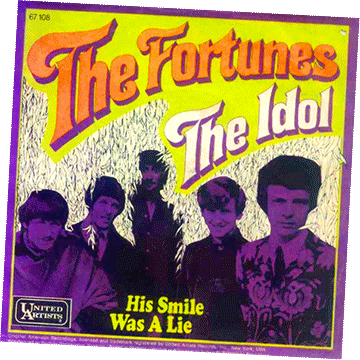
The Fortunes August 1967
What a terrific record for the summer of 1967, and with a wonderful B-side too! It has all the ingredients that capture the spirit of the time - both lyrically and musically. Why then did this innovative pop single by one of Birmingham's well known and internationally successful bands not become a hit?
The inclusion of Brum's famous harmony line-up 'The Fortunes' on this list will come as a surprise to many. The group had much chart success during the first half of the 1960s with lush orchestrated ballads, some composed by hit songwriters Greenaway and Cook. By 1967, the group decided on a new direction with a self-composed pop single in an effort to keep up with the times.
The Fortunes had composed original material before but their efforts usually ended up as single B-sides. 'The Idol' was credited to founding members Rod Allen (Bainbridge) and Barry Pritchard who had first performed together as a duo in 1960. With a lead vocal by Rod and arranged by famous producer Glyn Johns, the record was promoted on pirate radio stations and also issued in the USA.
The song (originally titled 'Sleeping Partner') tells the story of a rich and famous pop star who becomes disillusioned with his own success;
"I can walk on fitted carpet, I can swim down at my pool
I can throw expensive parties, yes afford to be a fool
There are girls round every corner, but they only want to be
Just a partner for a short time, to the idol that is me"
There's also a great dreamy "psychedelic" fade-out at the end of the recording. The single's very short B-side titled 'His Smile Was A Lie' is also worth a good listen. Again composed by Rod and Barry, it's even more trippy and features that Brummie of all instruments - The Mellotron.
Sadly, this record's lack of chart success resulted in The Fortunes reverting back to their tried and proven formula of commercial sounding ballads composed by external songwriters.
Hole In My Shoe
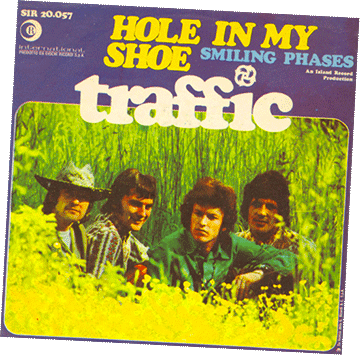
Traffic August 1967
This could well be THE summer of 1967 record. Supposedly inspired by a dream Dave Mason had at Traffic's legendary cottage, 'Hole In My Shoe' is a pop song as memorable as it is accessible for anyone from age six to sixty. What started out as a bit of nonsense, very nearly gave the group a Number One hit in the UK charts.
Dave Mason had become quite adept at playing the Indian sitar by this time which went along great with Chris Wood's flute and Jim Capaldi's inventive drumming on this record. Steve Winwood played the Mellotron very effectively on the track which along with Dave's lead vocal and echoey group harmonies, gives the record a dreamy, out-of-this-world feeling.
Lyrically, the song has nursery rhyme, almost child-like words similar to John Lennon's 'Lucy In The Sky With Diamonds' which may have been a major influence at the time;
"I looked to the sky where an elephant's eye
Was looking at me from a bubblegum tree
And all that I knew was the hole in my shoe
Which was letting in water"
There's also a great spoken-word segment half way through the song performed by six year old Francine Heimann who was step daughter of Island Records boss Chris Blackwell. It goes;
"I climbed on the back of a giant albatross
Which flew through a crack in the cloud
To a place where happiness reigned all year round
And music played ever so loudly"
Unlike the first Traffic single, this second A-side was credited only to Dave Mason who was taken by surprise with the record's success. Dave said; "The only reason I started writing songs was because I didn't want to ride on Steve's back." Sadly, the friendship between Steve and Dave would deteriorate, but for now at least, the group were riding high on their European success while another much more lucrative market across the Atlantic awaited their attention.
Flowers In The Rain

The Move September 1967
By the summer of 1967, The Move had gone full-blown "psychedelic" at the urging of their publicity-seeking London manager Tony Secunda who soon demanded that Roy Wood write a song about the new "flower power" movement that was grabbing news headlines at the time. Roy as usual, came up with the goods and what a great job he made of it too.
With a memorable thunderstorm sound effect intro and lead vocal by Carl Wayne, the song lyrics and the catchy chorus to 'Flowers In The Rain' perfectly captures the spirit of the times without becoming a parody of itself;
"I'm just sitting watching flowers in the rain
Feel the power of the rain, making the garden grow
I'm just sitting watching flowers in the rain
Feel the power of the rain keeping me cool"
'Flowers In The Rain' owes some of its attraction to future Marc Bolan and David Bowie producer Tony Visconti who assisted Denny Cordell in getting the sound he wanted. Tony said; "They were going to throw that track out because it had a little sort of slump in tempo to it. So I scored oboe, clarinet, cor anglaise and French horn, and for the middle section, we recorded it at double-speed which gave it a very unusual sound."
The single almost made it to Number One in the UK charts with the additional fame of being the first record played by Tony Blackburn on the BBCs new "Radio 1" pop station. Unfortunately, group manager Tony Secunda went too far when he had controversial promotional postcards printed for Flowers In The Rain resulting in Roy Wood losing his royalties for the song as well as the single's B-side 'The Lemon Tree' that was covered by fellow Brum band The Idle Race.
Love And Beauty

The Moody Blues September 1967
'Love And Beauty' is a real lost gem of a recording, ignored or undiscovered by many Moody Blues fans. Historically though, it's one of their most significant records as it's their first to feature the famous 'Mellotron' that would become a trade-mark of the Moodies sound for the next decade.
This record was composed by keyboardist Mike Pinder who had previously collaborated with the Moody's former front-man Denny Laine in composing original songs for the group. Recorded on July 17, 1967, 'Love And Beauty' marked a historic occasion when Mike played his recently purchased Mellotron MK II on the session. He had bought it second hand at a bargain price from Birmingham's Dunlop Tyres factory recreation centre.
Producer Tony Clarke called the Mellotron "the smallest symphony orchestra in the world" although it was still seen as more of a novelty at the time. Paul McCartney had previously played one for the memorable intro on The Beatles ground-breaking 'Strawberry Fields Forever'. Mike Pinder was very familiar with the temperamental instrument's potential as he had worked at Streetly Electronics near Sutton Coldfield in the factory where the Mellotron was made.
Mike's lyrics for 'Love And Beauty' touched on the subject of social consciousness and awareness - issues he would increasingly explore during his time with The Moody Blues;
"I wish that I could change the world
For every boy there'd be a girl for him to know
And maybe people would look up
Then they might realize they're not the only ones alive
Love and beauty should be everybody's duty
To welcome every man as a friend"
Strangely, Love And Beauty was never mixed or issued in stereo. This innovative 45, backed with Justin Hayward's 'Leave This Man Alone' was unfortunately not a hit but you can be sure the group's next single, issued before the end of this exciting and influential year, certainly would be.
Follow Me
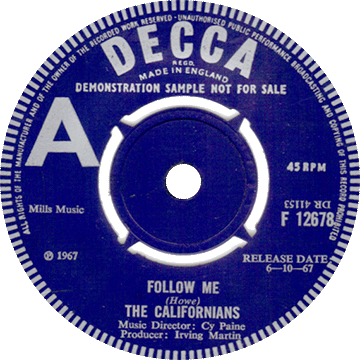
The Californians October 1967
This second summer of 1967 single release from The Californians sounds very American which makes it hard to believe the band were from the "Black Country" in the West Midlands. The Californians 'Follow Me' was a cover of the U.S. singing duo 'Lyme & Cybelle'.
The publishing credit on the 45 reads "Howe" although this is likely a mistake as it's the name of the duo's producer. Lyme was an alias used by famous American songwriter/musician Warren Zevon who actually composed the song. The Californians version of Follow Me sounds more commercial and radio-friendly, no doubt due to their producer Irving Martin and the highly-polished vocal harmonies of the group members.
Though the Californians made some great records, they suffered in the same respect as The Montanas in that they lacked internal songwriters who were capable of coming up with hit material. The tuneful B-side to Follow Me however, was apparently composed by The Montanas Terry Rowley and manager Roger Allen.
The Californians, though popular locally, never managed to get the big chart hit they were clearly capable of. If you've not heard their records before, do look them up as they are well worth a listen.
You've Got To Be Loved
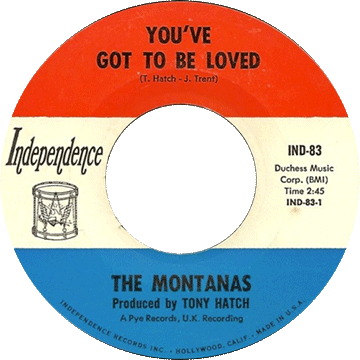
The Montanas October 1967
If there was ever a 'hit' that should have been then this is it. 'You've Got To Be Loved' actually did make the charts in the USA where it was especially popular on the West Coast. Unfortunately for the band, it wasn't until later they found out about the record's American success by which time a golden opportunity was lost.
Like their previous 1967 releases, 'You've Got To Be Loved' was brilliantly produced by Tony Hatch who along with hit songwriter Jackie Trent, composed this catchy pop song. Lyrically, there's not a lot of depth to it but you can't deny the radio-friendly melody and production along with the wonderful trade-mark vocal harmonies by the group.
Pye Records did push the record in the UK with newspaper advertisements and plenty of radio airplay, but it just didn't catch fire. However, on the other side of the Atlantic, it was a different story. A small Hollywood-based record label called "Independence" issued The Montanas 'You've Got To Be Loved' where it made Top 10 in the West Coast charts and eventually sold enough copies to break into the national Top 100 for a few months peaking at Number 33.
The group didn't know their records were getting issued and receiving airplay in the USA. The Montanas bass guitarist Jake Elcock said; "It was Johnny Jones (lead vocal) who found out about the American charts. He was an avid reader of New Musical Express and Melody Maker whereupon he made the discovery."
Subsequent record releases from The Montanas were also good but their lack of UK chart success resulted in the record company pulling the plug on Tony Hatch who was recording tracks for the group's first album. The Montanas continued to make great records for other labels with line-up changes along the way but they would never again attain the highs and lows experienced during that summer of 1967.
Impostors Of Life's Magazine
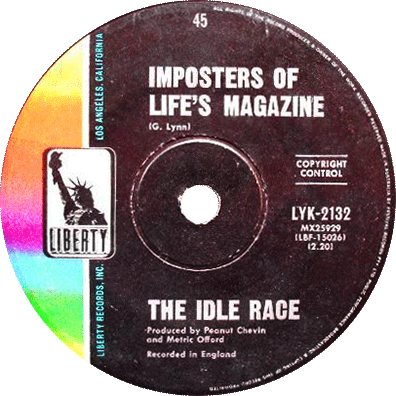
The Idle Race October 1967
This one sounds something like The Beatles on helium, or at least after drinking a lot of strong coffee (or something to that effect). Nonetheless, it's a great record for 1967 from a great Birmingham group who were formerly Brum Beat pioneers Mike Sheridan's Nightriders. Significantly in rock music history, it's also the first published song written by a young G. Lynn !!
The first Idle Race single titled 'Lemon Tree' was actually a Move song composed by Roy Wood. This 45 was issued only in the USA as the record company cancelled the UK release. A reason given was Jeff Lynne didn't want Idle Race to be known as a "cover band". More likely, it was because The Move were forced to hand over royalties for their hit 'Flowers In The Rain' and its B-side 'Lemon Tree' following the infamous Harold Wilson lawsuit. We may never know for sure.
What we do know from 'Impostor's Of Life's Magazine' is that Jeff Lynne had an early knack for composing catchy pop songs although lyrically it's still a bit obscure;
"How do you know, what you feel, is it real, is it?
How do you know, what you see, is it seen, is it?
Impostors of life's magazine"
The speeded-up instruments on the record indicate Jeff Lynne's fascination for new sounds while future YES producer Eddie Offord proved a worthy influence on the future ELO front-man. This single, backed with another original Jeff composition titled 'Sitting In My Tree' wasn't a hit although it won the group many admirers. Jeff's chagrin at age 19 when discovering his name was spelt incorrectly on his first record can well be imagined but you can be sure it never happened again.
Here We Go Round The Mulberry Bush

Traffic November 1967
This was a Number 8 in the UK charting single composed and recorded by Jim Capaldi, Dave Mason, Steve Winwood, and Chris Wood. The record also featured in the sound track for a British film of the same name that was typical of those associated with the "Summer of Love" during 1967.
Starring Judy Geeson (To Sir With Love) and a young Barry Evans (who went on to fame in the popular 'Doctor In The House' TV series), the film was based on a "coming of age" novel by Hunter Davies of which director Clive Donner turned into a teen sex comedy/drama for the big screen. The sound track included recordings by Andy Ellison (of the group "John's Children") and Steve Winwood's former band The Spencer Davis Group who also make a cameo appearance in the movie.
The Traffic song and book title is derived from the well-known old English nursery rhyme. It was actually one of the first tracks recorded by the band who at the time had yet to make a decision as to the name of their new group. Jim Capaldi's lyrics are typically obscure for the time and fit well with the child-like atmosphere of the recording;
"Here we go round in circles to nowhere
Mulberry bush just won't let me see
If I am lonely when I arrive there
Mulberry bush, will you shelter me?"
Traffic were to have appeared in The Beatles "Magical Mystery Tour" television special. For this, they were filmed performing 'Here We Go Round The Mulberry Bush' but it was cut from the final released version of the film. Their 'Here We Go Round The Mulberry Bush' single was issued with the more psychedelically-styled 'Coloured Rain' as its B-side.
Nights In White Satin
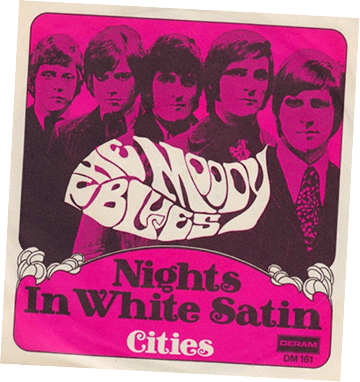
The Moody Blues November 1967
What a great record to end 1967 with! The Moody Blues had come a long way since their international hit record 'Go Now' had topped the charts in 1965. 'Nights In White Satin' was to signal the start of a new era in rock music. Justin Hayward's inspiration for the song was white satin bed sheets given to him by his girlfriend at the time.
When Justin Hayward sang and played for the first time his latest song on acoustic guitar to the rest of the group in the summer of 1967, they seemed only mildly impressed. "Play that again" said Mike Pinder who then proceeded to add a Mellotron riff. The rest of the group soon joined in and with the addition of Ray Thomas' famous flute solo along with an orchestra or two to complete their sonic masterpiece, a classic was born.
Orchestras had of course featured on pop records before, but this time it was different in that the group provided some direction as to how the orchestra was used rather than leaving it up to a producer or arranger to embellish recordings as they pleased.
The Moody Blues' second album titled 'Days Of Future Passed' Would emerge at the end of 1967 as a milestone in popular music, becoming a major influence on what would be known as "progressive rock". All the group members contributed songs, including spoken poetry that helped link the songs together into a grand concept.
'Nights In White Satin', reached Number 9 in the UK, becoming The Moody Blues first Top 20 hit since 'Go Now'. The record would be re-issued in the early 1970s - getting to Number 1 in some charts!
"Gazing at people, some hand in hand
Just what I'm going through, they can't understand
Some try to tell me, thoughts they cannot defend
Just what you want to be, you will be in the end
And I love you, yes I love you
Oh how I love you"
Copyright © John R Woodhouse 2017